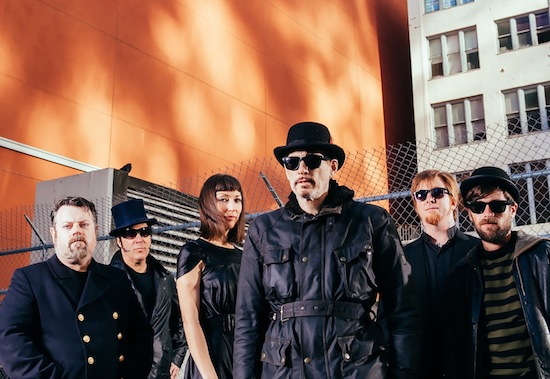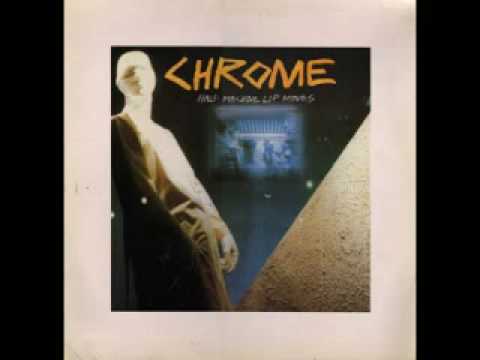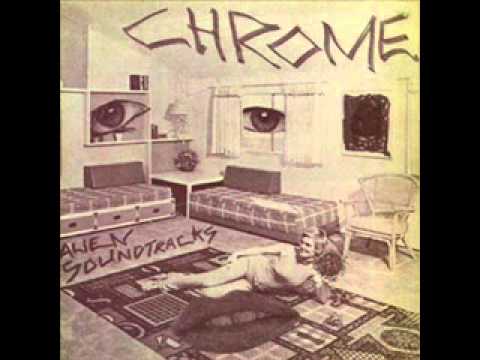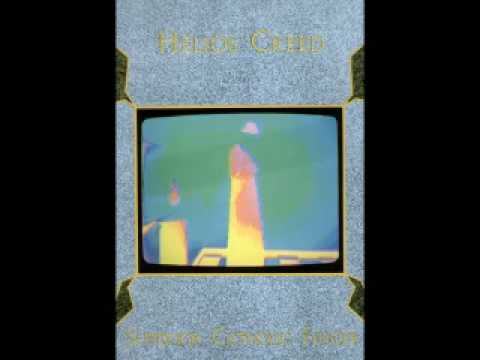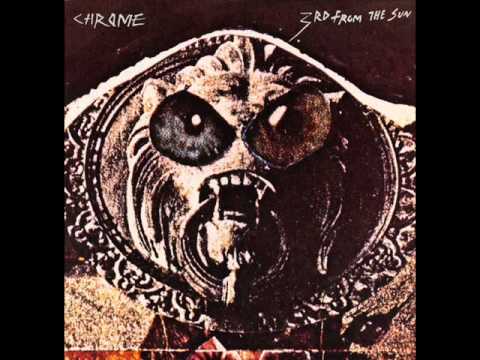Photograph courtesy of Jeremy Harris
Spawned unto the world in 1976 like a mutant beast from an unearthly morass of twisted steel on a splatter movie, San Franciscans freaks Chrome have loomed large ever since as a triumph for murky noise alchemy – borne of technology gone wrong, and thriving in a blizzard of information overload. Forced to lurk in the shadows of relative obscurity for the vast majority of the last four decades, the fevered brainchild of twin ne’er-do-wells Helios Creed and Damon Edge, in the band’s most celebrated incarnation, created post-apocalyptic junkyard chic still unmatched for outtasight dementia and Stoogian/Stygian bliss well into the twenty-first century. Somehow a band beyond both punk and psychedelia, their twisted racket came closest to the sound of Martians attempting to reinterpret earthling rock music with a load of old washing machine parts, home-made effects pedals and a copy of the Fill Your Head With Rock compilation on scratched vinyl, played backwards.
These enlightened dirtbags possessed a genuine capacity to bewilder unlike any others. Gritty, crotch-level rock abandon, yet allied to a bracing vortex of aural anarchy that seemingly rendered street noise, cultural detritus and TV scree unto DMT-addled plateaux unknown, frequently all within the same couple of minutes. Accidentally analogous to the irreverent yet synapse-shattering literary dimensions of the likes of Philip K. Dick and Kurt Vonnegut in Marshall-stack and four-track form, the classics of Chrome were as much about the silver of Iggy Pop’s Raw Power-era strides as they were the hue of a 1930s Flash Gordon spacecraft.
Yet, to hosannas from the cult of casualties who worship ’em, future tenses have shifted and warped like the ocean of trash from whence Chrome arrived, to usher in a new era for this unnatural force. Moreover, the resurrection of said scrap metal colossus is quite the spectacle to behold. Warning signals were first acknowledged with the recent release of Half Machine From The Sun – The Lost Chrome Tracks From ’79-’80, which despite being ostensibly comprised of cutting-room floor morsels from the band’s golden era, couldn’t help but sound alarmingly fresh and satisfyingly perplexing in true Chrome style. Yet now, Feel It Like A Scientist, the new album under the Chrome name from acid-fried axeman and frontman Helios Creed, who has been handling the name since Damon Edge sadly succumbed to heart failure in 1995, is almost upon us, and blow us down if it isn’t a tonic for the troops.
This is no less than the spirit of the deathless Alien Soundtracks and Half-Machine Lip Moves reborn for the 21st century. Damon Edge’s kraut-damaged trash compactor percussion and malignant whine may be gone, and John Lambdin and Gary Spain, who also contributed to the former record, may be nowhere to be seen yet Feel It Like A Scientist manages to pull off the neat trick of mainlining the bizarre Chrome magick of yore without coming across as some Pixies-esque pastiche of the band’s greatest era. Decadent and deranged, yet possessed of a sleek, unearthly allure and refined for a still more confusing new age, it’s possibly the most welcome and fitting comeback album from a veteran avant garde artist since Celtic Frost’s tumultuous Monotheist hit the racks in 2006.
There are moments of spatial elegance herein, as on the crooning glide of the single ‘Prophecy’, which sounds like Scott Walker disassembled for interplanetary travel in the manner of Cordwainer Smith’s visionary sci-fi novel Norstrilia, and backed by a lounge-dwelling Monster Magnet. There’s dirge-dredging debauchery as on the slow-burning midrange meltathon of ‘The Mind’. There’s found-sound disorientation. There are eerie, opiated ambient washes. What’s more, the paint-stripping, third-eye-cleansing howl of Helios Creed’s guitar is everywhere, a veritable shower of asteroids on the consciousness.
Speaking to Helios himself by the medium of email, it turns out that this new effort was made very much with their earlier triumphs in mind. "We set out to top Half Machine Lip Moves, that was the paradigm", Helios confirms. "I told my band that we had to make the best Chrome album ever, and we undertook that challenge. We wanted to go beyond the brink of musical sanity in the spirit of Half Machine Lip Moves. Each song is a foreign planet and we want to impress the natives. And absolutely, it feels like the right time. It will be up to the fans to decide."
How does he feel that he approaches a Chrome record without his foil on those earlier records?
"Now is how I always thought Chrome could sound post Damon, but he’s always close when we record", he elaborates. "I just read that Paul McCartney said in Rolling Stone that he consults with a spiritual version of John Lennon when he composes songs and I’ve been saying that I’ve been doing that with Damon for years now! It seems like I can tell when he likes something and when he doesn’t like something. I get a very uncomfortable feeling when he doesn’t like something. Try to work under that pressure! He loves our new single ‘Prophecy’, ’cause I get a warm fuzzy feeling from him. Or maybe I just swallowed a fur ball."
The volatile chemistry of the two members’ relationship was the fuel for Chrome’s early triumphs, with Edge frequently stereotyped as bringing a more art-school sensibility to proceedings as opposed to Helios’ more rock & roll co-ordinates. Chrome had already made one album, 1976’s The Visitation before Creed came on board, on which Edge was joined by Spain and Mike Lowe. It’s a record, that, despite some agreeably warped leanings, can’t help but sound very slightly timid and trad compared to the lysergic hurricane that was soon to follow.
"We met at the New Riviera Hotel in North Beach in 1976, to talk about me being in the band as the lead singer" remembers Helios. "I liked him right away. I met him through Gary Spain who was in Chrome at the time and who I played gigs with in North Beach. Gary had brought me The Visitation and I really liked the production, and a lot of the musical work, but I wasn’t crazy about Mike Lowe’s vocals. It was definitely original, one of a kind. I could see how I fitted in and where it could go and I felt like I could help out. So I asked Gary to set up the meeting with Damon. I auditioned right after that and our prolific partnership didn’t stop for the next six years."
A lot of hot air is traditionally exhaled on the subject of a supposed ‘Year Zero’ mentality in rock music in the late 70s, yet Chrome’s early records do genuinely sound like the product of a rulebook being plunged with considerable force from their rickety craft into the vortex of outer space. Was such a mentality important to the way in which Damon and Helios saw the band in their early days, or were they trying to right the wrongs they saw around them? "Well, I wanted to be as good a guitar player as I could be, and I drew a lot from the rock traditions of the past so I didn’t totally set out to break with tradition", reflects Helios with admirable candour. "But we were approaching things from this really free and relaxed place with no pressure or scene or style to uphold. Damon and I had similar taste so we both didn’t like a lot of the popular rock on the radio at the time. And we were also listening to bands like The Velvet Underground and Iggy Pop and The Stooges, early punk that hadn’t made it yet like the B-52’s single ‘Rock Lobster’, tons of bands. "We let our music come out spontaneously, but I had studied rock for years and Damon had studied music in art school, so for us being spontaneous held a lot of lineage, but then the lineage got deconstructed. We didn’t call it that then or think about deconstructing anything, but its been discussed about our work since and I understand why. Also being that both of us were heavily into psychedelia, that gave us a lot of space for experimentation. We didn’t want to get stuck with rules. The punk scene soon developed rules. So when we started we wanted to get away from getting stuck in any one genre. Conceptually we wanted to meld the things that we were both were inspired by, like ridiculous sci-fi B-movies, sound bites, humour, certain heavy dark psychedelia, hard rock, those early punk influences like the Ramones, weird noises, aliens. I wouldn’t say we were trying to right any wrongs. We were just willing to experiment. Instead of the hippie flowery psychedelia why not the scary funny psychedelia, you know"
This ability to warp classic rock shapes into dark new dimensions particularly becomes clear upon grilling Helios on his early inspirations.
"Jimi Hendrix, Jeff Beck, Peter Green, Robert Fripp, Adrian Belew, Ron Asheton" he reels off. "In my formative years I studied each of these guitarist’s work and more. I’ve told my now infamous story for years that I went to see Black Sabbath on two hits of orange sunshine mixed with a big bag of Mescaline. The power they possessed and the loudness, the darkness, the heaviness – it was really remarkable, and I said that’s what I wanted to do! I wanted to recreate how they sounded on LSD, and was so inspired by that experience I began experimenting even more with my guitar. I had seen all the great acts live in the late 60s and early 70s, but that Sabbath show really changed my guitar playing. "
Another pivotal live show was by Jimi Hendrix. He continues, clearly warming to the theme, "He was already a huge influence. When I saw him live he had such elegance and class. He came out on the stage and eloquently said, ‘It’s gonna be loud. If you don’t like it loud you better leave.’ Then he began playing the beginning of ‘Voodoo Chile’ real quiet, but when the rhythm section joined in he leaped like a gazelle and landed right on the one. And it got really loud! Ever since I saw that show I’ve been addicted to stage power – I couldn’t believe the power he commanded. I was up in the balcony, and this was in Hawaii, where the audiences were usually really reserved, and they all started climbing and jumping down from the balcony to rush the stage! Everyone was out of control! I jumped down from the balcony too and landed on some hippy, but he was so high he didn’t care. It effected me in a very big way. Also I got turned onto Hawkwind; their weirdness and their lo-fi sound really became an approach I appreciated.
"When Punk hit it was very experimental in the early days and it was a great scene to keep developing my sound in. So by the time I met Damon and joined Chrome and was turned on to his spontaneous approach to producing, I had already been studying music seriously for years. I was just ready and so was he. That’s why our first collaborative work together, Alien Soundtracks, gelled right from the beginning." It would be easy to jump to the conclusion that psychedelic drugs played a distinct role in the creation of much of Creed and Edge’s best work. Whilst this is not entirely true, Helios does allow himself the odd moment of nostalgia on the subject. " One of my favourite memories was working on ‘Magnetic Dwarf Reptile’ from Alien Soundtracks, he reckons. "It was one of the few times we did acid together and we went on this laughing trip when the song was done and couldn’t stop. It was special and brought us closer together ’cause we realized we had a lot in common and could talk about music for hours. We had a good time on that song. It’s when we really started melding together. I had to be as twisted as Damon ’cause no one holds a candle to him as far as that goes. We didn’t do as much acid as people think we did, but we did for that song."
The band managed to gain a little more notoriety with each successive album in the early eighties, from the Stooges-on-Venus strains of 1980’s Red Exposure though Blood On The Moon‘s minimal post-punk melange to the gloriously nihilistic nocturnal trash-trawl of 82’s Third From The Sun, although the largely drum-machine driven and more conventionally structured music did somewhat lack the shock of old. "Those records actually sold more, but yes, we evolved, and they were popular in a different way." reflects Helios " They weren’t recorded in the same kinda way, but some of it was still spontaneous and some of it written. Every record has a different way of writing songs. We were going from one idea to another."
The duo splintered in the early 80s, as – following his marriage to Shakin’ Street vocalist Fabienne Shine – Damon Edge moved to Paris where he made several albums under the Chrome name with French musicians. Following his untimely demise, Helios assumed the name, having made a total of 21 head-spinning solo records for labels like Subterranean, Amphetamine Reptile and Mans Ruin in the late 80s and early 90s along with undergoing a spell in ex-Hawkwind gentleman nutjob Nik Turner’s band. Hawkwind had always been a kind of precursor to Chrome, and indeed it often seemed as though the latter outfit was attempting to take the former’s visionary-waster blueprint to another dimension. Thus, it’s curious to know what Helios took from the experience of playing with this legendary figure, notorious for confusing even his own fairly fearless band with sartorial liberties and musical follies alike.
"I think what impressed me about Nik is his dedication to his particular brand of psychedelic music", he reasons. "If there was just one person in the audience – which happened once – he’ll play a show just like a thousand people were there. Del Dettmar told me they did acid every night. I said ‘What? How do you guys play?’ The time I played live on acid I ended up doing the set naked ’cause I hate wearing clothes on acid. It was an underground show in a warehouse in Florida, and my guitar covered me up. But I prefer playing straight, I can’t really play properly otherwise.
"The Nik Turner tour was a circus on wheels. Once in a smaller town we saw some naked guy running down the road after we played and we thought, ‘Wow, this small town is so wild!’ Then the cops came to our hotel with our German light guy, tripping his brains out wrapped in a blanket, and they were asking ‘Is this guy with you?!’ The wild naked guy was ours. Touring with Nik made Spinal Tap look serious. I was criticised some for that tour at the time, because they’re seen as more hippy and I’m from a different generation. I did bring a different edge to the band that Americans seemed to appreciate. Tommy Grenas, my current longtime keyboard player in Chrome was on that tour as well."
As a member of a band who’ve always existed on some mythical radio containing few wavelengths audible to the human ear, exactly what kind of relationship does Helios have with the notion of psychedelia, and moreover, how does he feel about being held accountable for the evolution of industrial music, and particularly its American variants?
"One of my goals is to make an album that makes sense on acid, but we’re not as fanatically involved in that as Nik Turner is", he reasons. "The first part of the word psychedelic is psych and my first experience with psychic phenomena was through psychedelics. Chrome slips into the dark side, ’cause I like to think Chrome exposes you to heaven and hell simultaneously. Because they coexist.
"As to industrial, it became a formula. When it started, it was an experiment, just like punk. But that is the nature of human beings and how they socialize. We were the first industrial band to rock. See there were projects doing industrial music that was more opened ended, more artistic. We integrated rock with it. I continued with those ideas too in my solo work. I used a cheap tape recorder to record the industrial clanging sounds of a piledriver in downtown San Francisco on a skyscraper construction site. I put it on my second solo album Superior Catholic Finger from ’89, in the beginning of ‘Monster Lust’. The very nature of industrial goes off into some stranger [areas] that one might consider psychedelia.
"We’re always looking at things from a different angle; the underbelly, the dark side", he continues. "In Chrome sometimes when recording we use our ‘mistakes’ and work them and make them gold. We don’t hide from these things. I have these working methodologies that Damon and I developed. I’m always using sounds, notes, riffs, that maybe if I were in a straight band I’d be thinking weren’t perfect, but then in Chrome we work with them and make them the piece. I call it being Chromed. It takes a seasoned musician a while to get Chromed once they come in to work with me. I have to break down their illusions of what they think rock is. I look at Government cover-ups the same way. I’m into seeing what others want to hide, what’s behind the perfect facade. But as a band we’re not a political band, I like to think we’re more into magic then politics.
"The music that the Chrome of the 80s and early 90s made was mainly the experimental kind, more or less like ‘no humans allowed’. The difference with this record now it that it has all the elements of a Chrome record taking you to all those places but it is taking it to the next level. My solo work came from all different eras and different modes of expression. I just kept going; I never stopped, I kept exploring. All that experience, 38 years now of making albums, has culminated in this next work. I’ve sensed it from the beginning of the project – there is a certain epic quality to it."
All told, it’s hard to contain Helios’ enthusiasm for the new era of Chrome he’s found himself ushering in, the new album, and the new line-up, which, alongside long-time cohorts Grenas (formerly of Farflung) and "the best drummer in San Francisco" (Aleph Omega), includes new guitarist Lou Minatti (AKA Keith Thompson) bassist Steve Fishman and vocalist Monet Clark. "I can’t wait to fucking kick your asses with this new work and the new line up" he thunders. "My rhythm section is unsurpassed. Monet Clark is a performance and video artist and I haven’t worked with someone with an art world background who also likes to rock since Damon. Its rare in the rock world and I really appreciate having that influence back in the mix. She goes by Anne Dromida in Chrome, because that name for her just downloaded into two other band members’ minds simultaneously after our last recording session. I think it was a sign. Maybe it was Damon!"
"Everything’s the same" growled Damon Edge repeatedly with cyborg solemnity on the title track from Chrome’s Third From The Sun, thirty-three years ago. "Nothing has changed at all, changed in our world." Always a band out of time and beyond comparison, uniting future ghosts and shadows of a thousand years, the spirit of Chrome has never left the psychic viewfinders of the initiated since they first started sending their shockwaves from San Francisco. Maybe the world at large will never catch up, but in the meantime, Feel It Like A Scientist is just starting to usher in a whole new wave of vibrations and hallucinations.
"All this ahead of its time stuff, it just happened," reckons Helios. "We didn’t set out to be prophetic or ahead of our time. I didn’t know culture was going to have such a short attention span due to the digital age. Little has changed in terms of my surroundings, but I’m still an analogue/reel to reel tape guy at heart, struggling with the technology.
"Ya know, when you let go and let things come spontaneously like the methods we’ve used with Chrome, you do tap into things beyond the linear timeline."
Chrome are currently on tour in Europe – have a look at the dates below:
JUNE
Wed 4 – Underground, Cologne, Germany
Fri 6 – Kino, Ebensee, Austria
Sun 8 – Babylon, Berlin, Germany
Mon 9 – Lucerna Music Hall, Prague, Czech Republic
Wed 11 – Loppen, Copenhagen, Denmark
Thu 12 – Bla, Oslo, Norway
Sat 14 – Fight The Night festival at Äänivalli, Helsinki, Finland
Mon 16 – [venue tbc], Stockholm, Sweden
Tue 17 – [venue tbc], Gothenburg, Sweden
Wed 18 – Markhalle, Hamburg, Germany
Thu 19 – Vibes, Rotterdam, The Netherlands
Fri 20 – OCCII, Amsterdam, The Netherlands
Sat 21 – Electrowerkz, London

